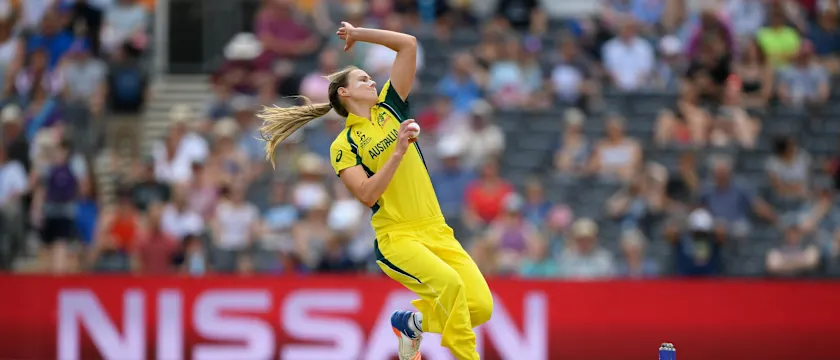We're motivated to create a legacy: Perry

The 2017 Women's World Cup in England isn't Ellyse Perry's first time at the rodeo. The Australian all-rounder participated in the 2009 event and starred in the victorious 2013 campaign, famously pushing through the pain barrier despite an ankle injury in the final. With six trophies lining the shelf, Australia is favourite to defend its title this year, but the competition has been such that it’s not invincible either; a fact the Aussies are acutely aware of.
Perry spoke to ICC and explained why Australia won't get a high off its past success, the bittersweet taste of a second-place finish at the Women's World Twenty20 last year, the increasing level of exposure in women's cricket, and more.
What do you think is the biggest difference between Australian cricket and other nations when it comes to translating potential?
We've been very fortunate to have some wonderful success. We have a strong culture within Australian cricket. Cricket is very much a part of every young Australian's summer, so you learn the game from a young age. And the conditions we have down in Australia help promote an attacking brand of cricket, helping take the game forward. We've been incredibly well run as a cricketing organisation by Cricket Australia and, before that, Women's Cricket Australia. They've done a lot in helping young people realise their dreams and potential. They're not unique qualities, but qualities you'd find in a number of countries around the world. But sporting success is so much a part of our culture, there's an ingrained competitive spirit in all Australians.
Australia has captured six of the 10 World Cup titles. What is the team's biggest motivation for a seventh title?
It's a new team, a new place. There's definitely a lot of time that's passed since the last tournament. For us as a team, this is a really special time in women's cricket. A lot has changed and we're loving every minute. The Australian team has been fortunate to be on the pointy end of that and receive tremendous amount of support to professionalise and promote our game. For us, it's a new era and we'd like to start that well. Everyone is motivated by creating a legacy that lasts a long period of time.
Yourself aside, five Australians participated in the English Super League. What did you learn from your stint about playing in England that might serve you well for the World Cup?
It was great, I really enjoyed it. It's good to see professional T20 leagues popping up around the world. Any exposure you get in terms of playing in local conditions is great preparation for a big tournament like the World Cup.
Does being the defending champions make any difference?
It's about starting afresh and challenging ourselves to play better and do better than we did the last time around. I've got no doubt the other teams are thinking the same things, but four years is a long time between World Cups. Teams have changed tremendously, ours (has) too. It's about creating our own identity rather than just repeating what worked for us last time. The slate has been completely wiped clean for everyone.
Who do you see you as the biggest threats to your bid for a seventh title?
England is in a unique position, playing the World Cup at home. It has played great cricket over a number of years. It has undergone some changes but it seem quite settled now. It’s very keen to do well. Right up there is New Zealand. It has a lot of depth and experience. Those two teams will be our toughest opponents. Add to that a team like South Africa, and India, who is always a great opponent and challenge. It's probably going to be the closest World Cup that I can recall.
#WWC17 AUS v NZ - Ellyse Perry Innings
Australia finished second in the 2016 Women's World T20. Could you still finish second and be satisfied with what you achieved?
I don't think so. I don't think anyone is. I don't mean to dismiss the achievement of reaching a final, especially a World Cup final. You always want to be in a position where you have a chance to win and obviously that means being in the final. Having experienced losing a final in the World T20 recently, it's not at all satisfying, it doesn't sit well and you're always left wanting more.
Are there lessons to be learnt from that defeat?
It's true what people say, that you learn more from the losses that you have rather than the wins. When you win really easily, it's easier to gloss over your shortcomings and sweep that right under the carpet. After all, you've won, so the misgivings are not as consequential. When you lose, it really highlights areas of concern and where you can improve as a team. For us, that was definitely the case after losing the final of the World T20. We've had a great opportunity over the last 12 months to work on that.
How much of a role does luck play in a tournament like the World Cup?
There's an element of luck in sport. Anything you do in life, really. But I'm a strong believer that people often create their own luck through hard work. The more prepared you are, the more likely things will fall into place and you perform well. It's about the person and the team and whether they're able to perform no matter what the circumstances are, good or bad.
FIFTY: Ellyse Perry brings up her half-century
So the will to win needs to be much more than the fear of losing.
Winning is a bit of a habit. And when teams get into that habit, it becomes a lot easier to win matches that they maybe have no business of winning. We've been lucky that we're considered the favourite in most matches and you definitely try to exploit that to your advantage. For teams that are not used to having as much success, not feeling that they can win most games, they often stumble when they do end up in positions to win. I look at it that way more than an outright fear of failure.
The prize money for the World Cup has moved up to $2 million, 10 times the amount given to the winners in 2013. Is this a watershed moment?
A lot of progress has been made over the last couple of years. I think the prize money is great recognition by the ICC of the importance of women's cricket. All these developments are brilliant.
In addition to that, 10 fixtures are being broadcast live on TV, and the remaining 21 World Cup matches are being streamed live.
It's a great thing to expose more people to the game and hopefully attract more fans to watch women's cricket. The more games broadcast, the better. It's important to get more and more young girls interested in the game and playing the game. I'm really chuffed when I meet them and see them in the crowd. Growing up, I always loved going out and watching matches and that always inspired me. There are so many great players in the game now. Whether that's the national team or the WBBL team, there's no dearth of players to come and watch now.

